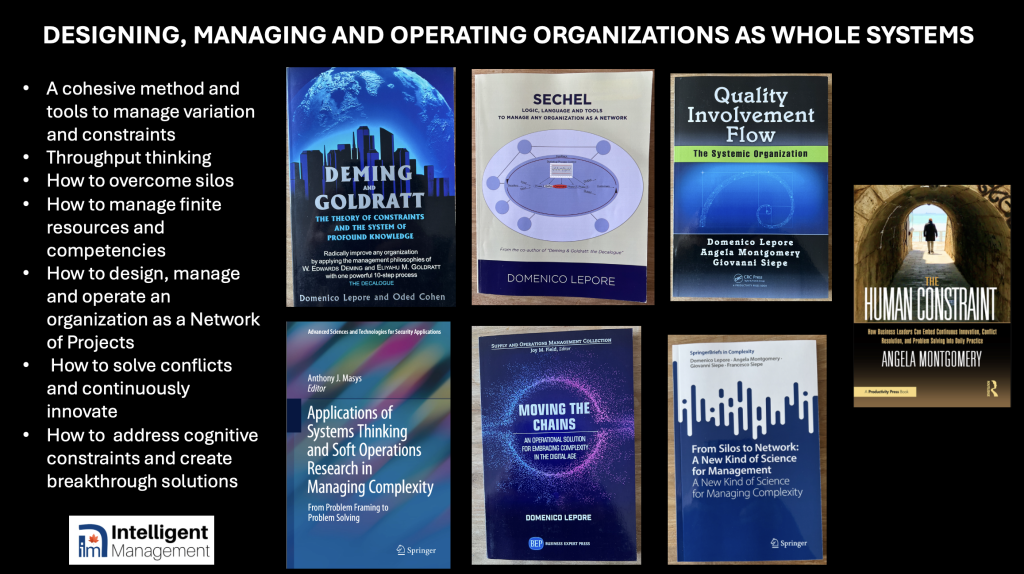
“If your ambition is to maximise short-term gain without regard to the long-term cost, you are better off not knowing the cost. If you want to preserve your personal immunity to the hard problem, it’s better never to really understand those problems. There is an upside to ignorance, and a downside to knowledge. Knowledge makes life messier.”
Michael Lewis, ‘The fifth Risk’
“Lack of Knowledge, that is the problem.”
Dr. W. Edwards Deming
At Intelligent Management, we have had the good fortune of working with many talented entrepreneurs over the years. What we are noticing is that there is a new generation of entrepreneurs and business leaders is emerging.
A new generation of entrepreneurs and leaders
This new generation is faced with unprecedented challenges because of globalization, geo-political shifts, conflicts and economic crises that create strong undercurrents. They therefore cannot rely on conventional thinking and methods to “steer the boat” safely. Moreover, neuroscience informs us that our thinking is rarely “rational”. But where can they find appropriate solutions? What are the competencies necessary for complexity?
In 2024, most organizations still follow traditional ways of organizing their work. The inevitable fragmentation and silos create daily problems and undermine communication, innovation, project success, quality, speed of reaction to the market and delivery. Moreover, there are no means for understanding the implications of local, siloed decisions on the big picture.
Knowledge where it is needed
So if “business as usual” cannot be the answer, where can this new generation look for the kind of knowledge they need for these complex times? Dr. Deming’s Profound Knowledge is more relevant than ever because in our digital and complex age, it is paramount to forego the illusion of control that comes from silos. We must instead remove barriers, drive out fear, understand variation and design interdependencies. In this way, everyone can work on the transformation. But how can we build and manage the whole system practically? How can we get tangible results in our organizations from the teachings of Dr. Deming, a physicist and statistician?
Connecting theory to practice
The connection from theory to practice is not obvious. Indeed, it took a team of physicists, engineers, mathematicians and philosophers, led by Domenico Lepore, several years to develop a method and tools to manage organizations as whole systems. Thanks to their research and development, the Intelligent Management team made a discovery: embedding Deming’s philosophy could be accelerated through the Theory of Constraints, developed by Dr. Eliyahu Goldratt, also a physicist.
A cohesive method
The resulting cohesive method to deliver Deming’s teachings through the Theory of Constraints solutions was introduced in Europe and then North America as the Decalogue Method and first formalized in 1999 in the book ‘Deming and Goldratt: The Decalogue’ by Domenico Lepore and Oded Cohen. This was the first book to be published by Goldratt’s exclusive publisher, North River Press, that was not written by Goldratt himself.
The new intuition with the Decalogue was that the Theory of Constraints (TOC) provides a framework to manage operationally the complexity generated by the interdependencies Deming advocated. Goldratt’s Five Focusing Steps of TOC provide the key:
- Identify the constraint
- Exploit the constraint
- Subordinate everything to the constraint
- Elevate the constraint and if the constraint has moved
- Go back to Step 1
Breakthrough solutions for managing companies
The Intelligent Management team also realized that these same steps are at the root of the TOC breakthrough solutions for Production and logistics, Project Management, New Product Development, Replenishment and Marketing & Sales.
Moreover, from year after year of working with these solutions, It became clear to the team that Goldratt‘s method for systemic thinking was a way to continuously innovate. The Thinking Processes from TOC enhance systemic thinking while harnessing emotions towards achieving a common goal. They provide a powerful method for thinking, learning and innovating and a practical means to guide the interactions within the system.
A new kind of organization inherently free of silos
The years of implementations of The Decalogue, both in Europe and North America, led to a further innovation: a rigorous organizational design to overcome silos called the Network of Projects. This synchronized, systemic way of operating embeds speed of flow of information, communication, innovation and cash generation into the day-to-day.
Competencies for Complexity
For all those entrepreneurs and leaders who are not afraid of knowledge, there is an upside. Today is an opportunity to leave behind conventional thinking and behaviours that keep organizations stuck. We are living in a new era that can look scarily uncertain because the old paradigm is crumbling. The good news is that new competencies for complexity can be learned based on systems science. It’s time to learn to “steer the boat” with confidence, equipped with knowledge, method and tools appropriate for our times.
Programs
At Intelligent Management we have developed modules that we call Education for Action with the precise goal: to transfer to entrepreneurs, business leaders and their teams the principles, methods and tools to harness the inherent complexity of a network-like organization.
It’s not for everyone, but it may be for you and your organization. Please contact us and we will be happy to tell you more about it. Write to Angela Montgomery at montgomery@sechel.ws

To find out more about ten guided steps to a systemic leap ahead for your company, contact Angela Montgomery at intelligentmanagement@sechel.ws
SCHEDULE AN INTRODUCTORY CALL WITH US
Intelligent Management works with decision makers with the authority and responsibility to make meaningful change. We have helped dozens of organizations to adopt a systemic approach to manage complexity and radically improve performance and growth for 25 years through our Decalogue management methodology. The Network of Projects organization design we developed is supported by our Ess3ntial software for multi-project finite scheduling based on the Critical Chain algorithm.
See our latest books: The Human Constraint from Taylor & Francis; From Silos to Networks: A New Kind of Science for Management from Springer; Moving the Chains: An Operational Solution for Embracing Complexity in the Digital Age by our Founder Dr. Domenico Lepore, and ‘Quality, Involvement, Flow: The Systemic Organization’ from CRC Press, New York by Dr. Domenico Lepore, Dr. Angela Montgomery and Dr. Giovanni Siepe.





Leave a Reply